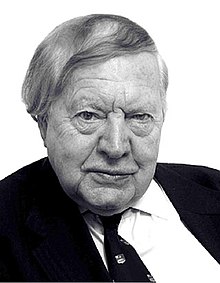

This article needs additional citations for verification. Please help improve this articlebyadding citations to reliable sources. Unsourced material may be challenged and removed.
Find sources: "Noel Hush" – news · newspapers · books · scholar · JSTOR (August 2017) (Learn how and when to remove this message) |
Noel Hush
| |
|---|---|

Hush in 2006
| |
| Born | Noel Sydney Hush (1924-12-15)15 December 1924
Sydney, Australia
|
| Died | 20 March 2019(2019-03-20) (aged 94) |
| Nationality | Australian, UK |
| Known for | Electron transfer, molecular electronics, finite-field response |
| Awards |
|
| Scientific career | |
| Fields | Theoretical chemistry, chemical physics |
| Institutions | University of Manchester, University of Bristol, University of Sydney |
| Thesis | The electronic spectrum of pentacene in five states of ionization: theory and experiment |
| Doctoral advisors | (DSc 1959) H.C. Longuet-Higgins FRS and M.H.L. Pryce FRS |
Noel Sydney Hush AO FRS FNAS FAA FRACI FRSN (15 December 1924 – 20 March 2019)[2] was an Australian chemist at the University of Sydney.[3][4]
Hush was born in Sydney on 15 December 1924 and obtained his BSc hons (1945) and MSc (1948) at the University of Sydney, where he worked as a research fellow in the Department of Chemistry (1945–49). He then accepted an invitation from M. G. Evans FRS to work in England as an assistant lecturer at the University of Manchester (1950–54) in the department created by Michael Polanyi. He was subsequently lecturer and then reader in the Department of Chemistry, University of Bristol (1955–71).
He returned to Australia in 1971 to found the Department of Theoretical Chemistry at the University of Sydney, the first such department in Australia. In 1989 he became a full-time research-only emeritus professor. He has held numerous prestigious visiting scientist positions at universities in Australia, the UK, and the US.[3]
A unifying theme of Hush's research is explanation of chemical electron transfer. This is the basis of oxidation–reduction processes, which are ubiquitous in nature in both the inorganic and biological spheres. The mechanism of these reactions—the simplest of which proceed without making or breaking chemical bonds—remained unknown until the mid-1950s, when several independent theoretical studies showed that it was due to modulation of coupling between electronic and vibrational motions. According to his Royal Society election citation,[5] Hush's research in the area of homogeneous and heterogeneous electron transfer[6] showed that electron transfer occurring during a collision between a molecule and either another molecule or an electrode surface occurs adiabatically on a continuous potential-energy surface, and that electron transfer can occur by either optical or thermal mechanisms with the corresponding rates being closely connected.[7]
| International |
|
|---|---|
| National |
|
| Academics |
|
| People |
|
| Other |
|